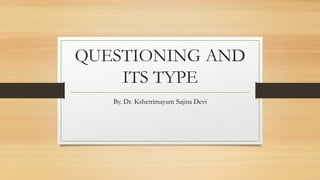
QUESTIONING AND ITS TYPE
- 1. QUESTIONING AND ITS TYPE By. Dr. Kshetrimayum Sajina Devi
- 2. QUESTIONING MEANING • To ask somebody a questions • It is used as one kind of mutual exchange of teaching skills between the teacher and students. • The goal is to check if the students understand what they have taught or not.to assess the students understanding .
- 3. IMPORTANCE OF QUESTIONING • It helps in developing the power of expression of the students. • It is help to ascertain the personal difficulties of the students. • It provide a check on preparation of assignments. • It can be used by teacher to maintain discipline in class. • It is used to promote thinking skill of the student. • It is used to draw attention in the class.
- 4. Types of questioning • 1 inference questions • In teacher-speak, inference questions are the types of questions that involve reading between the lines. Students are required to make an educated guess, as the answer will not be stated explicitly. Students must use clues from the text, coupled with their own experiences, to draw a logical conclusion. • When we make inferences while reading, we are using the evidence that is available in the text to draw a logical conclusion • An inference question requires you to make logical assumptions and connections by using the information in the passage to come up with a new conclusion. In other words, an inference question asks you to pick up on information that is indirectly given, rather than being directly stated in the passage
- 5. • 2. evaluation questions . • Evaluation questions articulate the main issues that will be explored by the assessment. They are usually developed after the goals and objectives of a programme have been decided and the activities to support those objectives have been determined. Evaluation questions are useful to: • Focus and provide structure to an evaluation; • Guide the evaluation planning process, including data gathering and the methods to be used to obtain the information that is important to the programme implementers, the beneficiaries, donors and other stakeholders; and • Inform how the results will be incorporated back into planning and implementation to improve the programme.
- 6. • 3. memory questions • The questions were asked according to the memory level of the student where they recall about what has been taught in the class by the teachers the questions were asked upon to that. • The process of forming a memory involves encoding, storing, retaining and subsequently recalling information and past experiences. • 4. information questions • a question in English to which an appropriate answer is to give information rather than to answer "yes" or "no": typically introduced by the word who, which, what, where, when, or how. Also called: information question.
- 7. • 5. summary questions • A comprehension question where you have to derive points from a particular part of the text The answer should be written in your own words Word limit of 80 words should be adhered to.